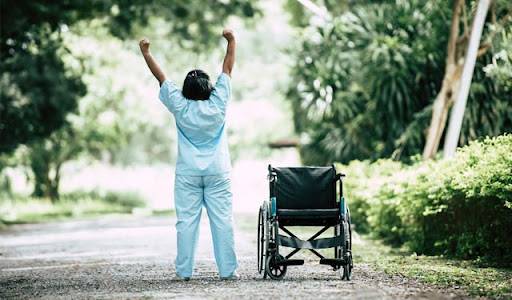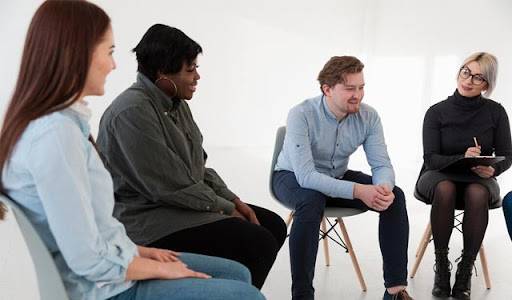Introduction
We come across different types of rehabilitation for various physical and mental ailments. Rehabilitation is the action or process of restoring one’s health using training or therapy. One of the most common scenarios about rehabilitation is surrounding addiction. However, work rehabilitation is not always considered a constructive procedure. Let’s understand more about it and the social perception of rehabilitation in this article.

Our Wellness Programs
What is the Rehabilitation Process?
Neuropsychological rehabilitation in a patient begins with creating a safe environment or sense of safety to help restore their cognitive, behavioural, emotional and psychological functioning.
The rehabilitation process usually involves a multidisciplinary team of specialists, and interventions may include group cognitive rehabilitation, psychoeducation and psychotherapy.A typical rehabilitation procedure includes the following elements:
- Psychoeducation enables patients and their families to understand the cause of their thinking or why they are experiencing changes.
- They empower patients with tools and strategies to help them improve their cognitive abilities and overall functioning and quality of life.
- Cognitive [1] rehabilitation helps address issues with attention deficiency, concentration, perception, communication, reasoning, memory, judgement, memory, initiation and planning.
- Putting strategies into practise by engaging in functioning activities
- Psychological support helps patients and their families cope with the consequences of the condition.
Looking for services related to this subject? Get in touch with these experts today!!
Experts

Kirti Bajpai

India
Psychologist
Experience: 5 years

Mansi Chawla

India
Psychologist
Experience: 12 years

Sapna Zarwal

India
Psychologist
Experience: 19 years

Tulika Chandra

India
Psychologist
Experience: 10 years

SEEMA TANEJA

India
Psychologist
Experience: 30 years
What are the Seven Stages of the Rehabilitation Process?
Overcoming addiction or mental health issues via rehabilitation is a stage-wise process. Here are the seven stages of restoration.
- Pre-contemplation: The individual struggling with an addiction or psychiatric problem shows apparent signs but is still in denial. These people tend to be defensive about their problems and are often resistant to treatment.
- Contemplation: In this stage, the affected individual is reeling under negative feelings like shame, guilt and depression. They become more receptive to their problem and contemplate undergoing rehabilitation with support from loved ones.
- Preparation: The individual takes small steps toward de-addiction and recovery. This stage ensures the person is fully prepared to undergo sustainable recovery.
- Action: Individuals begin taking the steps they had committed mentally and physically and learn new ways to cope with stress, anger, and sadness.
- Maintenance: In this stage, the individual is working on developing healthy habits and new coping mechanisms to deal with their mental health issue or addiction.
- Transcendence: People have lost their addictive cravings and signs and symptoms of mental health issues. They can now live better, healthier lives and are better in control of it.
- Recovery: People who have passed the transcendence phase enter the recovery phase.
Why is Neuropsychological Rehabilitation Different?
Neuropsychological rehabilitation works on similar principles as physical rehabilitation but is quite different. Doctors prefer using neuropsychological rehabilitation to restore cognitive, emotional, psychological, psychosocial and behavioural deficits caused by an injury to the brain, addiction to a substance, or mental health issues. In contrast, physical rehabilitation aims to restore the functionality of a body after following an injury.
Neuropsychological rehabilitation is complex. It deals with our body functions, especially personality traits and behaviour, that make us who we are. For this reason, neuropsychological rehabilitation usually involves multiple stages and is often comprehensive.
Neuropsychological rehabilitation is routinely used for treating neuropsychological problems, such as Attention Deficit Hyperactivity Disorder (A.D.H.D.), concussion and spinal cord injury. The goal of neuropsychological rehabilitation is to retain and restore neural pathways or train new neural pathways to regain or improve cognitive function reduced by trauma or disease. Physical rehabilitation aims to restore just the functionality of the affected limb or part of the body.
The Factors Affecting the Rehabilitation Process
Several factors affect the rehabilitation process, and these include:
- Medical: The excellent team of medical healthcare professionals who can diagnose the condition and create a comprehensive treatment plan. Every person might suffer from different mental health conditions, varying in intensity and duration. Hence, a personalised treatment plan is the way to go.
- Psychological: These factors include personality traits, self-motivation, mental health issues like depression, self-esteem and self-confidence. Studies have found that more self-motivated people take the rehabilitation process more sincerely.
- Environmental: These factors include aspects like how the individual views the rehabilitation atmosphere at a centre and support from family and friends during the rehabilitation stage and after discharge.
The Main Goals, Values, and Guiding Principles of Psychiatric Rehabilitation
The primary goal of psychiatric rehabilitation is to train and teach people with mental health illnesses cognitive, emotional, and social skills that enable them to live in the community.
Several principles are used in psychiatric rehabilitation, while the traditional values include:
- To convey hope, respect and belief that every individual is capable of growth.
- Recognising that culture is essential and central to recovery and ensuring all the services an individual receives are culturally relevant to them.
- Engage in an informed decision-making process with the patient
- Help individuals build strengths and capabilities.
- Use person-centred rehabilitation practices to address individuals’ needs consistent with their values, hopes and aspirations.
- Support the complete integration of people in their recovery stages into their communities where they can live everyday lives, accept responsibilities and explore their role as community members.
- Promote self-determination and empowerment so that each individual has the freedom to make their own decisions, including their rehabilitation services.
- Facilitate individuals to utilise naturally available support within their family, friends, and communities, including self-help groups.
- Ensure a well-integrated and coordinated rehabilitation plan that includes psychiatric, medical and holistic treatments.
Learn more about Hyperfixation vs. Hyperfocus
Do you think life is pointless?
Know about How To Make Him Worry About Losing You?
Conclusion
Regardless of its benefits, not every individual with a mental health condition requires rehabilitation. Psychiatric and neuropsychological rehabilitation assists people in reclaiming their lives and restoring their mental, physical, psychological and emotional health. Several unsaid cultural and societal norms have stigmatised seeking mental health help and opting for beneficial processes like rehabilitation. Though most of us look down upon rehabilitation, it effectively establishes balance in people’s lives and allows them the opportunity to live normally. Creating awareness about mental health conditions and normalising seeking care and rehabilitation can benefit more people than we can imagine.
If you wish to seek a consultation with mental health experts for rehabilitation, find specialists right here on United We Care!
Follow our Social Media for more updates:
References
| [1] | Wikipedia Contributors, “Cognition,” Wikipedia, Jul. 21, 2022. [Online]. Available: https://en.wikipedia.org/wiki/Cognition. [Accessed: Jul. 28, 2022] |


 Conflict Management in Relationships
Conflict Management in Relationships
 Healing from Heartbreak
Healing from Heartbreak Coping With Anxiety
Coping With Anxiety Get Started With Mindfulness
Get Started With Mindfulness


